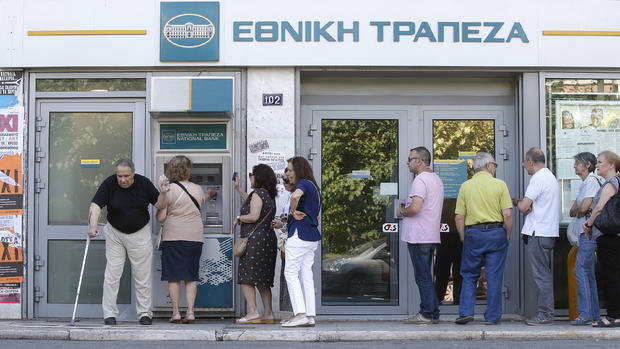Political wrangling leaves Greece bailout hanging by a thread
Greece's future in the eurozone lies in the hands of the country's restive parliament.
Greek Prime Minister Alexis Tsipras has until midnight to persuade lawmakers to give the nod to government spending cuts, tax hikes and other "austerity" measures required to unlock up to 86 billion euros ($94.6 billion) in emergency funding. With the cash-strapped country's banks still closed, failure to secure the bailout would almost certainly cause Greece to become the first member of the single currency to crash out of the union.
Tension over the rescue package erupted in clashes Wednesday between anti-austerity protestors and police. According to wire reports, some protestors hurled fire bombs at the police, which responded with pepper spray and tear gas.
Despite polls showing the Greeks wish to remain in the eurozone, swallowing another dose of austerity is proving a hard-sell. Members of Tsipras' ruling Syriza party are balking at the terms of the bailout, which he has argued Greece has little choice but to accept. More than half of Syriza's central committee has signed a statement attacking the agreement.
It remains unclear if Tsipras can hold his coalition together, though members of the opposition have said they would support the bailout.
"Being prime minister of Greece right now is a poison chalice," said Erik Jones, director of European and Eurasian Studies at the Johns Hopkins School of Advanced International Studies, in an email to CBS MoneyWatch, alluding to the difficulty of getting Greeks to accept measures that are harsher than what they rejected in a July 5 national referendum.
But "Tsipras appears to be a master of playing both sides of the fence, and so I am not sure he would lose an electoral contest," Jones added in speculating that Tsipras is likely to retain his position even if elections are called.
While many Greek lawmakers are finding it hard to stomach the bailout conditions, Germany, which is the country's largest creditor, is proving even more unyielding in easing the terms. Despite pressure from the International Monetary Fund, German Chancellor Angela Merkel is showing no signs of providing Greece the debt relief many economists say is desperately needed to help revive Greece's depressed economy.
That debt load has surged as a percentage of the country's gross domestic product since Athens began implementing austerity in 2010. Meanwhile, economic conditions in Greece have deteriorated during this latest phase of its debt crisis. Roughly a quarter of working-age people are unemployed in Greece, while the jobless rate for young people is a startling 50 percent. Some 40 percent of the nation's children live in poverty, according to government statistics, while average life expectancy has declined.
Although German, Dutch, Finnish and other hardliners in the eurozone strongly oppose a "haircut" in Greece's debt, other options are to give Greece more time to repay its loans or even offer a 30-year moratorium on debt payments, the IMF said in a report issued Wednesday.
"Stubbornness is something economists model quite badly," said Roberto Ringobon, an economist at MIT"s Sloan School of Management, in an email. "I always though this was a solvency issue and therefore some debt reduction was necessary, but the Germans were reluctant."
One constraint for Merkel: domestic politics. Eurasia Group analyst Famke Krumbmüller said any move to reduce Greece's loan obligation would alienate members of the country's parliament, putting her political future in jeopardy.
At the same time, Merkel and German Finance Minister Wolfgang Schäuble have made the IMF's participation in the bailout a prerequisite for a deal. That's because Germany and other eurozone countries would have to increase their financial contributions if the IMF withdrew from the bailout.
"The Germans are not going to be enthusiastic about that prospect," Jones said. It "will leave monitoring to the European Commission and the [European Central Bank]. The ECB doesn't really want that responsibility, and the Germans do not trust the European Commission to act alone. "
If Greek lawmakers approve the bailout agreement, the next key deadline is July 20, when Greece must make a 3.5 billion euro ($3.9 billion) payment to the ECB. Greece missed a $1.7 billion payment to the IMF earlier this month and a 456 million euro ($499 million) payment expected earlier this week. The country's European bailout package has also expired.
In a measure that could help the Greek government meet its short-term funding needs, German officials are considering allowing Greece to issue IOUs while it awaits the bailout money, a spokesman for Germany's Finance Ministry said on Wednesday.
